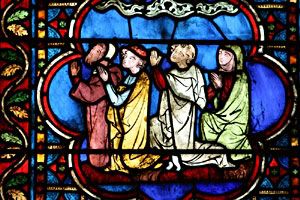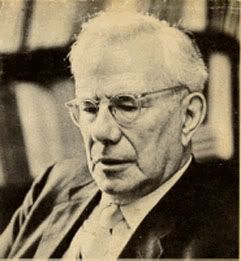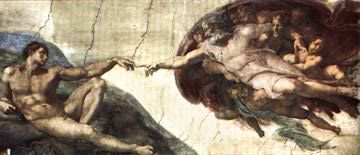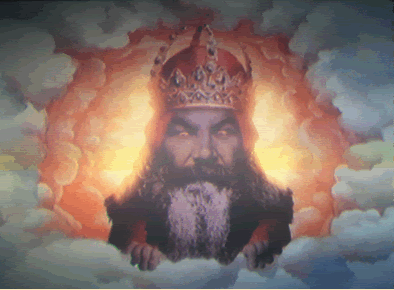
The discussion on method in the comment section of the last posts prompts me to post a couple of discussions from Metacrock's Blog that deal with theological method. Instead of proof and scientific verification of God we have the co-determinate. The co-determinate is verifiable. The relation between it and God is a matter of the religous a prori. These are understood in the sense of phenomenology.
Firt, no I The religious
a prori
(1) Scineitifc reductionism loses phenomena by re-defining the nature of sense data and quailia.
(2)There are other ways of Knowing than scientific induction
(3) Religious truth is apprehended phenomenologically, thus religion is not a scientific issue and cannot be subjected to a materialist critique
(4) Religion is not derived from other disciplines or endeavors but is a approach to understanding in its own right
Therefore, religious belief is justified on its own terms and not according to the dictates or other disciplines
--------------------------------------------------------------------------------
In my dealings with atheist in debate and dialogue I find that they are often very committed to an empiricist view point. Over and over again I hear the refrain "you can't show one single unequivocal demonstration of scientific data that proves a God exists." This is not a criticism. It's perfectly understandable; science has become the umpire of reality. It is to scientific demonstration that we appear for a large swath of questions concerning the nature of reality. The problem is that the reliance upon empiricism has led to forgetfulness about the basis of other types of questions. We have forgotten that essentially science is metaphysics, as such it is just one of many approach that can be derived from analytical reasoning, empiricism, rationalism, phenomenology and other approaches.
Problem with Empiricism
Is empirical evidence the best or only true form of knowledge? This is an apologetic question because it bears upon the arguments for the existence of God.
Is lack of empirical evidence, if there is a lack, a draw back for God arguments?
I deny that there is a lack, but it has to be put in the proper context. That will come in future threads, for this one I will bracket that answer and just assume there no really good empirical evidence (even though I think there is).
I will ague that empiricism is not true source of knowledge by itself and logic is more important.
True empirical evidence in a philosophical sense means exact first hand observation. In science it doesn't really mean that, it implies a more truncated process. Consider this, we drop two balls of different size from a tower. Do they fall the same rate or the bigger one falls faster? They are supposed to fall at the same rate, right? To say we have empirical proof, in the literal sense of the term we would have to observe every single time two balls are dropped for asl ong as the tower exists. We would have to sit for thousands of years and observe millions of drops and then we couldn't say it was truly empirical because we might have missed one.
That's impractical for science so we cheat with inductive reasoning. We make assumptions of probability. We say we observed this 40,000 times, that's a tight correlation, so we will assume there is a regularity in the universe that causes it to work this way every time. We make a statistical correlation. Like the surgeon general saying that smoking causes cancer. The tobacco companies were really right, they read their Hume, there was no observation fo cause and effect, because we never observe cause and effect. But the correlation was so tight we assume cause and effect.
The ultimate example is Hume's billiard balls. Hume says we do not see the cause of the ball being made to move, we only really see one ball stop and the other start. But this happens every time we watch, so we assume that the tight correlation gives us causality.
The naturalistic metaphysician assumes that all of nature works this way. A tight correlation is as good as a cause. So when we observe only naturalistic causes we can assume there is nothing beyond naturalism. The problem is many phenomena can fall between the cracks. One might go one's whole life never seeing a miraculous event, but that doesn't mean someone else doesn't observe such things. All the atheist can say is "I have never seen this" but I can say "I have." Yet the atheist lives in a construct that is made up of his assumptions about naturalistic c/e and excluding anything that challenges it. That is just like Kuhns paradigm shift. The challenges are absorbed into the paradigm until there are so many the paradigm has to shit. This may never happen in naturalism.
So this constructed view of the world that is made out of assumption and probabilities misses a lot of experience that people do have that contradicts the paradigm of naturalism. The thing is, to make that construct they must use logic. After all what they are doing in making the correlation is merely inductive reasoning. Inductive reasoning has to play off of deductive reasoning to even make sense.
Ultimately then, "empiricism" as construed by naturalist (inductive probabilistic assumptions building constructs to form a world view) is inadequate because it is merely a contract and rules out a prori much that contradicts.
The A priori
God is not given directly in sense data, God transcends the threshold of human understanding, and thus is not given amenable to empirical proof. As I have commented in previous essays (bloodspots) religion is not a scientific question. There are other methodologies that must be used to understand religion, since the topic is essentially inter-subjective (and science thrives upon objective data). We can study religious behavior through empirical means and we can compare all sorts of statistical realizations through comparisons of differing religious experiences, behaviors, and options. But we cannot produce a trace of God in the universe through "objective" scientific means. Here I use the term "trace" in the Derision sense, the "track," "footprint" the thing to follow to put us on the scent. As I have stated in previous essays, what we must do is find the "co-determinate," the thing that is left by God like footprints in the snow. The trace of God can be found in God's affects upon the human heart, and that shows up objectively, or inter-subjectively in changed behavior, changed attitudes, life transformations. This is the basis of the mystical argument that I use, and in a sense it also have a bearing upon my religious instruct argument. But here I wish to present anther view of the trace of God. This could be seen as a co-determinate perhaps, more importantly, it frees religion from the structures of having to measure up to a scientific standard of proof: the religious a prori.
Definition of the a priori.
"This notion [Religious a priori is used by philosophers of religion to express the view that the sense of the Divine is due to a special form of awareness which exists along side the cognitive, moral, and aesthetic forms of awareness and is not explicable by reference to them. The concept of religion as concerned with the awareness of and response to the divine is accordingly a simple notion which cannot be defined by reference other than itself." --David Pailin "Religious a pariori" Westminster Dictionary of Christian Theology (498)
The religious a priroi deals with the spacial nature of religion as non-derivative of any other discipline, and especially it's spacial religious faculty of understanding which transcends ordinary means of understanding. Since the enlightenment atheist have sought to explain away religion by placing it in relative and discardable terms. The major tactic for accomplishing this strategy was use of the sociological theory of structural functionalism. By this assumption religion was chalked up to some relative and passing social function, such as promoting loyalty to the tribe, or teaching morality for the sake of social cohesion. This way religion was explained naturalistically and it was also set in relative terms because these functions in society, while still viable (since religion is still around) could always pass away. But this viewpoint assumes that religion is derivative of some other discipline; it's primitive failed science, concocted to explain what thunder is for example. Religion is an emotional solace to get people through hard times and make sense of death and destruction (it's a ll sin, fallen world et). But the a priori does away with all that. The a priori says religion is its own thing, it is not failed primitive sincere, nor is it merely a crutch for surviving or making sense of the world (although it can be that) it is also its own discipline; the major impetus for religion is the sense of the numinous, not the need for explanations of the natural world. Anthropologists are coming more and more to discord that nineteenth century approach anyway.
Thomas A Indianopolus
prof of Religion at of Miami U. of Ohio
Cross currents
"It is the experience of the transcendent, including the human response to that experience, that creates faith, or more precisely the life of faith. [Huston] Smith seems to regard human beings as having a propensity for faith, so that one speaks of their faith as "innate." In his analysis, faith and transcendence are more accurate descriptions of the lives of religious human beings than conventional uses of the word, religion. The reason for this has to do with the distinction between participant and observer. This is a fundamental distinction for Smith, separating religious people (the participants) from the detached, so-called objective students of religious people (the observers). Smith's argument is that religious persons do not ordinarily have "a religion." The word, religion, comes into usage not as the participant's word but as the observer's word, one that focuses on observable doctrines, institutions, ceremonies, and other practices. By contrast, faith is about the nonobservable, life-shaping vision of transcendence held by a participant..."
The Skeptic might argue "if religion as this unique form of consciousness that sets it apart form other forms of understanding, why does it have to be taught?" Obviously religious belief is taught through culture, and there is a good reason for that, because religion is a cultural construct. But that does not diminish the reality of God. Culture teaches religion but God is known to people in the heart. This comes through a variety of ways; through direct experience, through miraculous signs, through intuitive sense, or through a sense of the numinous. The Westminster's Dictionary of Christian Theology ..defines Numinous as "the sense of awe in attracting and repelling people to the Holy." Of course the background assumption I make is, as I have said many times, that God is apprehended by us mystically--beyond word, thought, or image--we must encode that understanding by filtering it through our cultural constructs, which creates religious differences, and religious problems.
The Culturally constructed nature of religion does not negate the a priori. "Even though the forms by Which religion is expressed are culturally conditioned, religion itself is sui generis .. essentially irreducible to and undeceivable from the non-religious." (Paladin). Nor can the a priori be reduced to some other form of endeavor. It cannot be summed up by the use of ethics or any other field, it cannot be reduced to explanation of the world or to other fields, or physiological counter causality. To propose such scientific analysis, except in terms of measuring or documenting effects upon behavior, would yield fruitless results. Such results might be taken as proof of no validity, but this would be a mistake. No scientific control can ever be established, because any study would only be studying the culturally constructed bits (by definition since language and social sciences are cultural constructs as well) so all the social sciences will wind up doing is merely reifying the phenomena and reducing the experience. In other words, This idea can never be studied in a social sciences sense, all that the social sciences can do is redefine the phenomena until they are no longer discussing the actual experiences of the religious believer, but merely the ideology of the social scientist (see my essay on Thomas S. Kuhn.
The attempt of skeptics to apply counter causality, that is, to show that the a priori phenomena is the result of naturalistic forces and not miraculous or divine, not only misses the boat in its assumptions about the nature of the argument, but it also loses the phenomena by reduction to some other phenomena. It misses the boat because it assumes that the reason for the phenomena is the claim of miraculous origin, “I feel the presence of God because God is miraculously giving me this sense of his presence.” While some may say that, it need not be the believers argument. The real argument is simply that the co-determinate are signs of the trace of God in the universe, not because we cant understand them being produced naturalistically, but because they evoke the sense of numinous and draw us to God. The numinous implies something beyond the natural, but it need not be “a miracle.” The sense of the numinous is actually a natural thing, it is part of our apprehension of the world, but it points to the sublime, which in turn points to transcendence. In other words, the attribution of counter causality does not, in and of itself, destroy the argument, while it is the life transformation through the experience that is truly the argument, not the phenomena itself. Its the affects upon the believer of the sense of Gods presence and not the sense of Gods presence that truly indicates the trance of God.
Moreover, the attempts to reduce the causality to something less than the miraculous also lose the phenomena in reification.William James, The Verities of Religious Experience (The Gilford Lectures):
"Medical materialism seems indeed a good appellation for the too simple-minded system of thought which we are considering. Medical materialism finishes up Saint Paul by calling his vision on the road to Damascus a discharging lesion of the occipital cortex, he being an epileptic. It snuffs out Saint Teresa as an hysteric, Saint Francis of Assisi as an hereditary degenerate. George Fox's discontent with the shams of his age, and his pining for spiritual veracity, it treats as a symptom of a disordered colon. Carlyle's organ-tones of misery it accounts for by a gastro-duodenal catarrh. All such mental over-tensions, it says, are, when you come to the bottom of the matter, mere affairs of diathesis (auto-intoxication most probably), due to the perverted action of various glands which physiology will yet discover. And medical materialism then thinks that the spiritual authority of all such personages is successfully undermined."
This does not mean that the mere claim of religious experience of God consciousness is proof in and of itself, but it means that it must be taken on its own terms. It clearly answers the question about why God doesn't reveal himself to everyone; He has, or rather, He has made it clear to everyone that he exists, and He has provided everyone with a means of knowing Him. He doesn't get any more explicit because faith is a major requirement for belief. Faith is not an arbitrary requirement, but the rational and logical result of a world made up of moral choices. God reveals himself, but on his own terms. We must seek God on those terms, in the human heart and the basic sense of the numinous and in the nature of religious encounter. There are many aspects and versions of this sense, it is not standardized and can be describes in many ways:
Forms of the A priori.
Schleiermacher's "Feeling of Utter Dependence.
Frederick Schleiermacher, (1768-1834) in On Religion: Speeches to it's Cultured Disposers, and The Christian Faith, sets forth the view that religion is not reducible to knowledge or ethical systems. It is primarily a phenomenological apprehension of God consciousness through means of religious affections. Affections is a term not used much anymore, and it is easily confused with mere emotion. Sometimes Schleiermacher is understood as saying that "I become emotional when I pay and thus there must be an object of my emotional feelings." Though he does vintner close to this position in one form of the argument, this is not exactly what he's saying.
Schleiermacher is saying that there is a special intuitive sense that everyone can grasp of this whole, this unity, being bound up with a higher reality, being dependent upon a higher unity. In other words, the "feeling" can be understood as an intuitive sense of "radical contingency" (int he sense of the above ontological arguments).He goes on to say that the feeling is based upon the ontological principle as its theoretical background, but doesn't' depend on the argument because it proceeds the argument as the pre-given pre-theoretical pre-cognitive realization of what Anslem sat down and thought about and turned into a rational argument: why has the fools said in his heart 'there is no God?' Why a fool? Because in the heart we know God. To deny this is to deny the most basic realization about reality.
Rudolph Otto's Sense of the Holy (1868-1937)
The sense of power in the numinous which people find when confronted by the sacred. The special sense of presence or of Holiness which is intuitive and observed in all religious experience around the world.
Paul Tillich's Object of Ultimate Concern.
We are going to die. We cannot avoid this. This is our ultimate concern and sooner or latter we have to confront it. When we do we realize a sense of transformation that gives us a special realization existentially that life is more than material.
see also My article on Toilet's notion of God as the Ground of Being.
Tillich's concept made into God argument.
As Robert R. Williams puts it:
There is a "co-determinate to the Feeling of Utter dependence.
"It is the original pre-theoretical consciousness...Schleiermacher believes that theoretical cognition is founded upon pre-theoretical inter subjective cognition and its life world. The latter cannot be dismissed as non-cognitive for if the life world praxis is non-cognitive and invalid so is theoretical cognition..S...contends that belief in God is pre-theoretical, it is not the result of proofs and demonstration, but is conditioned soley by the modification of feeling of utter dependence. Belief in God is not acquired through intellectual acts of which the traditional proofs are examples, but rather from the thing itself, the object of religious experience..If as S...says God is given to feeling in an original way this means that the feeling of utter dependence is in some sense an apparition of divine being and reality. This is not meant as an appeal to revelation but rather as a naturalistic eidetic"] or a priori. The feeling of utter dependence is structured by a correlation with its whence." , Schleiermacher the Theologian, p 4.
The believer is justified in assuming that his/her experiences are experiences of a reality, that is to say, that God is real.
Freedom from the Need to prove.
Schleiermacher came up with his notion of the feeling when wrestling with Kantian Dualism. Kant had said that the world is divided into two aspects of reality the numinous and the phenomenal. The numinous is not experienced through sense data, and sense God is not experineced through sense data, God belongs only to the numinous. The problem is that this robbs us of an object of theological discourse. We can't talk about God because we can't experience God in sense data. Schleiermacher found a way to run an 'end round' and get around the sense data. Experience of God is given directly in the "feeling" apart form sense data.
This frees us form the need to prove the existence of God to others, because we know that God exists in a deep way that cannot be entreated by mere cultural constructs or reductionist data or deified phenomena. This restores the object of theological discourse. Once having regained its object, theological discourse can proceed to make the logical deduction that there must be a CO-determinate to the feeling, and that CO-determinate is God. In that sense Schleiermacher is saying "if I have affections about God must exist as an object of my affections"--not merely because anything there must be an object of all affections, but because of the logic of the co-determinate--there is a sense of radical contingency, there must be an object upon which we are radically contingent.
apologetics, existence of God. Arguemnts, Philosohpy of Religious, Religious a priori
II. The Trace of God
In my dealings with atheist in debate and dialogue I find that they are often very committed to an empiricist view point. Over and over again I hear the refrain "you can't show one single unequivocal demonstration of scientific data that proves a God exists." This is not a criticism. It's perfectly understandable; science has become the umpire of reality. It is to scientific demonstration that we appear for a large swath of questions concerning the nature of reality. The problem is that the reliance upon empiricism has led to forgetfulness about the basis of other types of questions. We have forgotten that essentially science is metaphysics, as such it is just one of many approach that can be derived from analytical reasoning, empiricism, rationalism, phenomonology and other approaches.
God is not given directly in sense data, God transcends the threshold of human understanding, and thus is not given amenable to empirical proof. As I have commented in previous essays (bloodspots) religion is not a scientific question. There are other methodologies that must be used to understand religion, since the topic is essentially inter-subjective (and science thrives upon objective data). We can study religious behavior through empirical means and we can compare all sorts of statistical realizations through comparisons of differing religious experiences, behaviors, and options. But we cannot produce a trace of God in the universe through "objective" scientific means. Here I use the term "trace" in the Derision sense, the "track," "footprint" the thing to follow to put us on the scent. As I have stated in previous essays, what we must do is find the "co-detemrinate," the thing that is left by God like footprints in the snow. The trace of God can be found in God's affects upon the human heart, and that shows up objectively, or inter-subjectvely in changed behavior, changed attitudes, life transformations. This is the basis of the mystical argument that I use, and in a sense it also have a bearing upon my religious instruct argument. But here I wish to present anther view of the trace of God. This could be seen as a co-detmiernate perhaps, more importantly, it frees religion from the structures of having to measure up to a scientific standard of proof: the religious
a prori.
Definition of the a priori.
"This notion [Religious a priori] is used by philosophers of religion to express the view that the sense of the Divine is due to a special form of awareness which exists along side the cognitive, moral, and aesthetic forms of awareness and is not explicable by reference to them. The concept of religion as concerned with the awareness of and response to the divine is accordingly a simple notion which cannot be defined by reference other than itself." --David Pailin "Religious
a pariori"
Westminster Dictionary of Chrisian Theology (498)
The religious
a priroi deals with the speicial nature of religion as non-derivative of any other discipline, and especially it's speicial reiigious faculty of understanding which transcends ordinary means of understanding. Since the enlightenment atheist have sought to explain away religion by placing it in relative and discardable terms. The major tactic for accomplishing this strategy was use of the sociological theory of structural functionalism. By this assumption religion was chalked up to some relative and passing social function, such as promoting loyalty to the tribe, or teaching morality for the sake of social cohesion. This way religion was explained naturalistically and it was also set in relative terms because these functions in society, while still viable (since religion is still around) could always pass away. But this viewpoint assumes that religion is derivative of some other discipline; it's primitive failed science, concocted to explain what thunder is for example. Religion is an emotional solace to get people through hard times and make sense of death and destruction (it's a ll sin, fallen world et). But the a priori does away with all that. The a priori says religion is its own thing, it is not failed primitive sincere, nor is it merely a crutch for surviving or making sense of the world (although it can be that) it is also its own discipline; the major impetus for religion is the sense of the numinous, not the need for explanations of the natural world. Anthropologists are coming more and more to discord that nineteenth century approach anyway.
Thomas A Indianopolus
prof of Religion at of Miami U. of Ohio
Cross currents
"It is the experience of the transcendent, including the human response to that experience, that creates faith, or more precisely the life of faith. [Huston] Smith seems to regard human beings as having a propensity for faith, so that one speaks of their faith as "innate." In his analysis, faith and transcendence are more accurate descriptions of the lives of religious human beings than conventional uses of the word, religion. The reason for this has to do with the distinction between participant and observer. This is a fundamental distinction for Smith, separating religious people (the participants) from the detached, so-called objective students of religious people (the observers). Smith's argument is that religious persons do not ordinarily have "a religion." The word, religion, comes into usage not as the participant's word but as the observer's word, one that focuses on observable doctrines, institutions, ceremonies, and other practices. By contrast, faith is about the nonobservable, life-shaping vision of transcendence held by a participant..."
The Skeptic might argue "if religion as this unique form of consciousness that sets it apart form other forms of understanding, why does it have to be taught?" Obviously religious belief is taught through culture, and there is a good reason for that, because religion is a cultural construct. But that does not diminish the reality of God. Culture teaches religion but God is known to people in the heart. This comes through a variety of ways; through direct experience, through miraculous signs, through intuitive sense, or through a sense of the numinous. The Westminster's Dictionary of Christian Theology ..defines Numinous as "the sense of awe in attracting and repelling people to the Holy." Of course the background assumption I make is, as I have said many times, that God is apprehended by us mystically--beyond word, thought, or image--we must encode that understanding by filtering it through our cultural constructs, which creates religious differences, and religious problems.
The Culturally constructed nature of religion does not negate the
a priori. "Even though the forms by Which religion is expressed are culturally conditioned, religion itself is
sui generis .. essentially irreducible to and undeceivable from the non-religious." (Paladin). Nor can the a priori be reduced to some other form of endeavor. It cannot be summed up by the use of ethics or any other field, it cannot be reduced to explanation of the world or to other fields, or physiological counter causality. To propose such scientific analysis, except in terms of measuring or documenting effects upon behavior, would yield fruitless results. Such results might be taken as proof of no validity, but this would be a mistake. No scientific control can ever be established, because any study would only be studying the culturally constructed bits (by definition since language and social sciences are cultural constructs as well) so all the social sciences will wind up doing is merely reifying the phenomena and reducing the experience. In other words, This idea can never be studied in a social sciences sense, all that the social sciences can do is redefine the phenomena until they are no longer discussing the actual experiences of the religious believer, but merely the ideology of the social scientist (see my essay on
Thomas S. Kuhn.
The attempt of skeptics to apply counter causality, that is, to show that the a priori phenomena is the result of naturalistic forces and not miraculous or divine, not only misses the boat in its assumptions about the nature of the argument, but it also loses the phenomena by reduction to some other phenomena. It misses the boat because it assumes that the reason for the phenomena is the claim of miraculous origin, “I feel the presence of God because God is miraculously giving me this sense of his presence.” While some may say that, it need not be the believers argument. The real argument is simply that the co-determinate are signs of the trace of God in the universe, not because we cant understand them being produced naturalistically, but because they evoke the sense of numinous and draw us to God. The numinous implies something beyond the natural, but it need not be “a miracle.” The sense of the numinous is actually a natural thing, it is part of our apprehension of the world, but it points to the sublime, which in turn points to transcendence. In other words, the attribution of counter causality does not, in and of itself, destroy the argument, while it is the life transformation through the experience that is truly the argument, not the phenomena itself. Its the affects upon the believer of the sense of Gods presence and not the sense of Gods presence that truly indicates the trance of God.
Moreover, the attempts to reduce the causality to something less than the miraculous also lose the phenomena in reification.
William James,
The Verieties of Religious Experience (The Gilford Lectures):
"Medical materialism seems indeed a good appellation for the too simple-minded system of thought which we are considering. Medical materialism finishes up Saint Paul by calling his vision on the road to Damascus a discharging lesion of the occipital cortex, he being an epileptic. It snuffs out Saint Teresa as an hysteric, Saint Francis of Assisi as an hereditary degenerate. George Fox's discontent with the shams of his age, and his pining for spiritual veracity, it treats as a symptom of a disordered colon. Carlyle's organ-tones of misery it accounts for by a gastro-duodenal catarrh. All such mental over-tensions, it says, are, when you come to the bottom of the matter, mere affairs of diathesis (auto-intoxication most probably), due to the perverted action of various glands which physiology will yet discover. And medical materialism then thinks that the spiritual authority of all such personages is successfully undermined."
This does not mean that the mere claim of religious experience of God consciousness is proof in and of itself, but it means that it must be taken on its own terms. It clearly answers the question about why God doesn't reveal himself to everyone; He has, or rather, He has made it clear to everyone that he exists, and He has provided everyone with a means of knowing Him. He doesn't get any more explicit because faith is a major requirement for belief. Faith is not an arbitrary requirement, but the rational and logical result of a world made up of moral choices. God reveals himself, but on his own terms. We must seek God on those terms, in the human heart and the basic sense of the numinous and in the nature of religious encounter. There are many aspects and versions of this sense, it is not standardized and can be describes in many ways:
Forms of the A priori.
Schleiermacher's "Feeling of Utter Dependence.
Frederick Schleiermacher, (1768-1834) in On Religion: Speeches to it's Cultured Disposers, and The Christian Faith, sets forth the view that religion is not reducible to knowledge or ethical systems. It is primarily a phenomenological apprehension of God consciousness through means of religious affections. Affections is a term not used much anymore, and it is easily confused with mere emotion. Sometimes Schleiermacher is understood as saying that "I become emotional when I pay and thus there must be an object of my emotional feelings." Though he does vintner close to this position in one form of the argument, this is not exactly what he's saying.
Schleiermacher is saying that there is a special intuitive sense that everyone can grasp of this whole, this unity, being bound up with a higher reality, being dependent upon a higher unity. In other words, the "feeling" can be understood as an intuitive sense of "radical contingency" (int he sense of the above ontological arguments).He goes on to say that the feeling is based upon the ontological principle as its theoretical background, but doesn't' depend on the argument because it proceeds the argument as the pre-given pre-theorectical pre-cognitive realization of what Anselm sat down and thought about and turned into a rational argument: why has the fools said in his heart 'there is no God?' Why a fool? Because in the heart we know God. To deny this is to deny the most basic realization about reality.
Rudolph Otto's Sense of the Holy (1868-1937)

The sense of power in the numinous which people find when confronted by the sacred. The special sense of presence or of Holiness which is intuitive and observed in all religious experience around the world.
Payul Tillich's Object of Ultimate Concern.

We are going to die. We cannot avoid this. This is our ultimate concern and sooner or latter we have to confront it. When we do we realize a sense of transformation that gives us a special realization existentially that life is more than material.
see also
My article on Toilet's notion of God as the Ground of Being.
Tillich's concept made into God argument.
As Robert R. Williams puts it:
There is a "co-determinate to the Feeling of Utter dependence.
"It is the original pre-theoretical consciousness...Schleiermacher believes that theoretical cognition is founded upon pre-theoretical inter subjective cognition and its life world. The latter cannot be dismissed as non-cognitive for if the life world praxis is non-cognitive and invalid so is theoretical cognition..S...contends that belief in God is pre-theoretical, it is not the result of proofs and demonstration, but is conditioned soley by the modification of feeling of utter dependence. Belief in God is not acquired through intellectual acts of which the traditional proofs are examples, but rather from the thing itself, the object of religious experience..If as S...says God is given to feeling in an original way this means that the feeling of utter dependence is in some sense an apparition of divine being and reality. This is not meant as an appeal to revelation but rather as a naturalistic eidetic"] or a priori. The feeling of utter dependence is structured by a corrolation with its whence." , Schleiermacher the Theologian, p 4.
The believer is justified in assuming that his/her experiences are experiences of a reality, that is to say, that God is real.
Freedom from the Need to prove.
Schleiermacher came up with his notion of the feeling when wrestling with Kantian Dualism. Kant had said that the world is divided into two aspects of reality the numinous and the phenomenal. The numinous is not experienced through sense data, and sense God is not experienced through sense data, God belongs only to the numinous. The problem is that this robs us of an object of theological discourse. We can't talk about God because we can't experience God in sense data. Schleiermacher found a way to run an 'end round' and get around the sense data. Experience of God is given directly in the "feeling" apart form sense data.
This frees us form the need to prove the existence of God to others, because we know that God exists in a deep way that cannot be estreated by mere cultural constructs or reductionist data or deified phenomena. This restores the object of theological discourse. Once having regained its object, theological discourse can proceed to make the logical deduction that there must be a CO-determinate to the feeling, and that CO-determinate is God. In that sense Schleiermacher is saying "if I have affections about God must exist as an object of my affections"--not merely because anything there must be an object of all affections, but because of the logic of the co-determinate--there is a sense of radical contingency, there must be an object upon which we are radically contingent.






